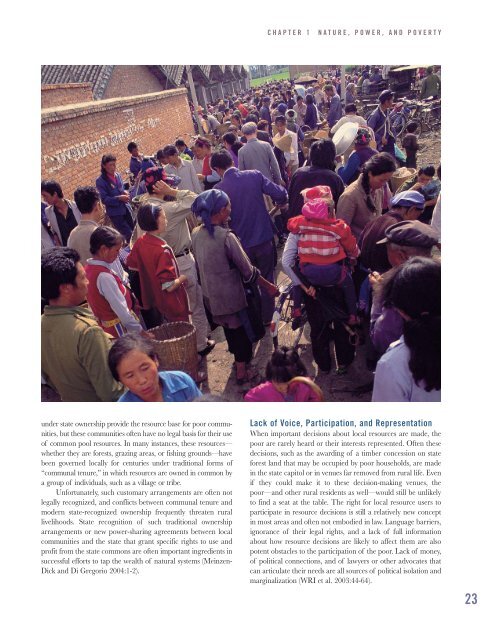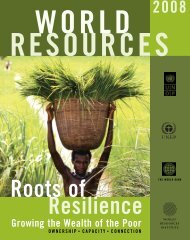jp8589 WRI.qxd - World Resources Institute
jp8589 WRI.qxd - World Resources Institute
jp8589 WRI.qxd - World Resources Institute
You also want an ePaper? Increase the reach of your titles
YUMPU automatically turns print PDFs into web optimized ePapers that Google loves.
CHAPTER 1<br />
NATURE, POWER, AND POVERTY<br />
under state ownership provide the resource base for poor communities,<br />
but these communities often have no legal basis for their use<br />
of common pool resources. In many instances, these resources—<br />
whether they are forests, grazing areas, or fishing grounds—have<br />
been governed locally for centuries under traditional forms of<br />
“communal tenure,” in which resources are owned in common by<br />
a group of individuals, such as a village or tribe.<br />
Unfortunately, such customary arrangements are often not<br />
legally recognized, and conflicts between communal tenure and<br />
modern state-recognized ownership frequently threaten rural<br />
livelihoods. State recognition of such traditional ownership<br />
arrangements or new power-sharing agreements between local<br />
communities and the state that grant specific rights to use and<br />
profit from the state commons are often important ingredients in<br />
successful efforts to tap the wealth of natural systems (Meinzen-<br />
Dick and Di Gregorio 2004:1-2).<br />
Lack of Voice, Participation, and Representation<br />
When important decisions about local resources are made, the<br />
poor are rarely heard or their interests represented. Often these<br />
decisions, such as the awarding of a timber concession on state<br />
forest land that may be occupied by poor households, are made<br />
in the state capitol or in venues far removed from rural life. Even<br />
if they could make it to these decision-making venues, the<br />
poor—and other rural residents as well—would still be unlikely<br />
to find a seat at the table. The right for local resource users to<br />
participate in resource decisions is still a relatively new concept<br />
in most areas and often not embodied in law. Language barriers,<br />
ignorance of their legal rights, and a lack of full information<br />
about how resource decisions are likely to affect them are also<br />
potent obstacles to the participation of the poor. Lack of money,<br />
of political connections, and of lawyers or other advocates that<br />
can articulate their needs are all sources of political isolation and<br />
marginalization (<strong>WRI</strong> et al. 2003:44-64).<br />
23

















